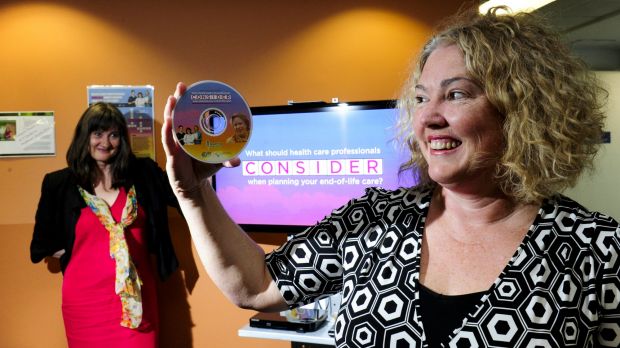
Clinical nurse consultant Sue Quayle and support project officer for cancer ambulatory and community and palliative aged care nurse practitioner Nikki Johnston. Photo: Melissa Adams
Health professionals need to focus on family needs, listening and respect when dealing with end-of-life planning for patients, according to research which has revealed a gap in what health professionals and patients believe is important.
The research has led to the development of a new DVD called Consider which was launched at Canberra Hospital this week.
Sue Quayle, clinical project support clinical nurse consultant, said the research was done with healthcare professionals and consumers to identify what was viewed as important in planning end-of-life care.
Comfort was the only thing which was viewed as important by both groups.
“Both groups identified with that but the things the consumer identified were not the things the health professionals identified,” she said.
Ms Quayle said the research found consumers thought listening, communicating respect and family support were important.
The DVD stemmed from an award-winning research poster. Ms Quayle acknowledged those involved in the research.
“The DVD looked at taking those words and weaving them into some real life situations that we’ve encountered as members of the nursing and palliative care team,” she said.
“We wanted to have real people in real situations expressing those sentiments that were consistent with what we’d identified as being important themes.
“We believe the results send a message to health professionals from consumers that care should focus on family needs, listening skills, communicating respect and imparting knowledge.
“They were the things that were really important to consumers and they were not the things that had necessarily been identified by health professionals.”
Ms Quayle said the DVD was about trying to remove some of the barriers between consumers and healthcare professionals in having the difficult conversations around planning for end-of-life care.
“What we want to help raise awareness around is it (death) being a natural part of life, rather than the end of a failed process. When you take that out of the conversation, it’s much easier for people to talk about what’s important to them,” she said.
“The DVD shows the people and the extended families and the networks to whom these conversations ultimately become very important to.”
